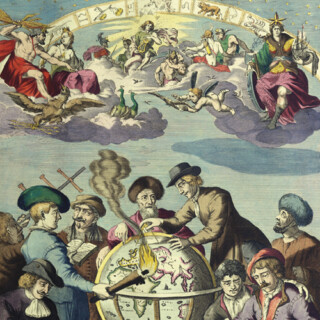The most up to date rendering of the Heavens at the beginning of the eighteenth century
Stellarum Fixarum Boreale [and] Stellarum Fixarum Australe.
London,
engrav'd and sold by J. Senex at the Globe over against St Dunstan's Church Fleetstreet. Where may be had the Zodiac, containing all the Stars hitherto Observed, to which the Moon Planets can at any time apply: very useful in Astronomical Observations, particularly in finding the Longitude at Sea. Also the Solar System describing the Planets and the Comets from Sr. S. I. Newton.by Wil. Whiston M.A.,
[c1721].
Pair of engraved celestial charts, fine original hand colour.
(northern hemisphere) 726 by 664mm (28.5 by 26.25 inches); (southern hemisphere) 716 by 661mm (28.25 by 26 inches).
14513
notes:
Senex's rare star charts in full original colour.
At the beginning of the eighteenth century there was a great demand, from scientists and navigators alike, for an extensive and reliable star catalogue and atlas. The charts of John Seller were unreliable, those of Johannes Hevelius unobtainable, and the perfectionist John Flamsteed was reluctant to issue his great celestial atlas. The demand was met by the cartographer and mapseller John Senex, who - with the con...
At the beginning of the eighteenth century there was a great demand, from scientists and navigators alike, for an extensive and reliable star catalogue and atlas. The charts of John Seller were unreliable, those of Johannes Hevelius unobtainable, and the perfectionist John Flamsteed was reluctant to issue his great celestial atlas. The demand was met by the cartographer and mapseller John Senex, who - with the con...
bibliography:
provenance:







![SENEX, John Stellarum Fixarum Boreale [and] Stellarum Fixarum Australe.](https://i0.wp.com/crouchrarebooks.com/wp-content/uploads/2025/03/14513_1H.jpg?fit=3220%2C3500&ssl=1)
![SENEX, John Stellarum Fixarum Boreale [and] Stellarum Fixarum Australe.](https://i0.wp.com/crouchrarebooks.com/wp-content/uploads/2025/03/14513_2H.jpg?fit=3222%2C3500&ssl=1)
![SENEX, John Stellarum Fixarum Boreale [and] Stellarum Fixarum Australe.](https://i0.wp.com/crouchrarebooks.com/wp-content/uploads/2025/03/14513_3H.jpg?fit=3262%2C3500&ssl=1)
![SENEX, John Stellarum Fixarum Boreale [and] Stellarum Fixarum Australe.](https://i0.wp.com/crouchrarebooks.com/wp-content/uploads/2025/03/14513_4H.jpg?fit=3299%2C3500&ssl=1)
